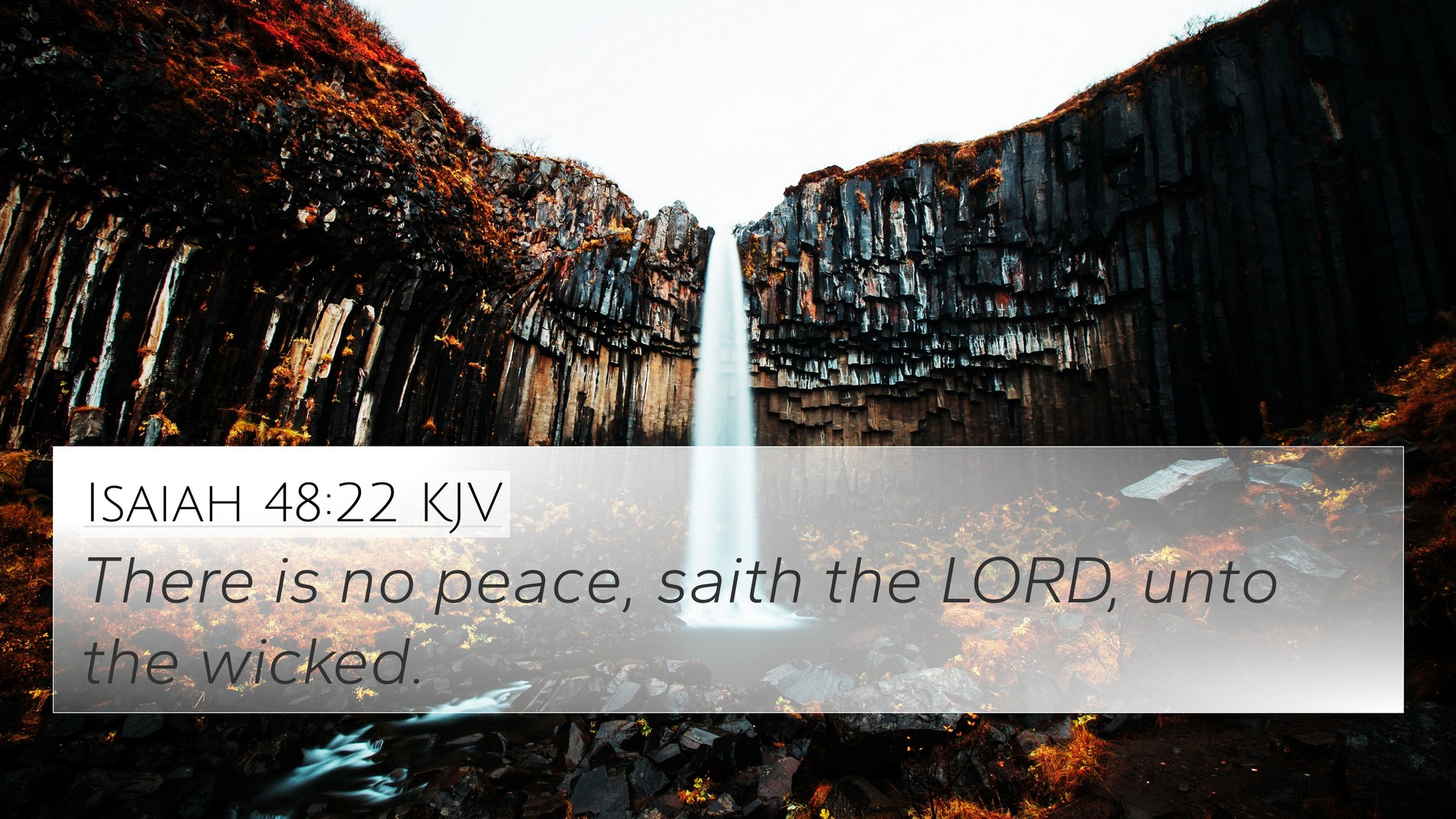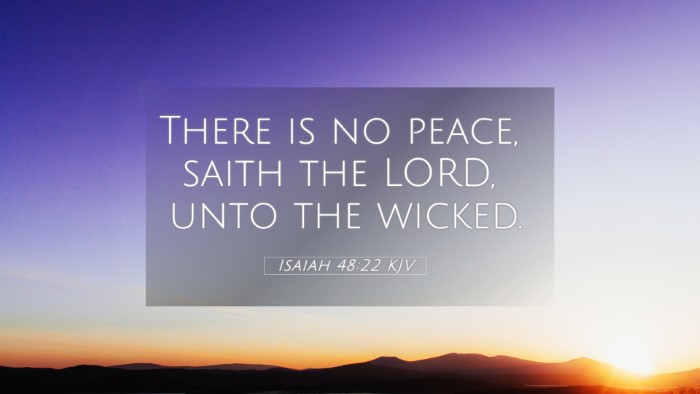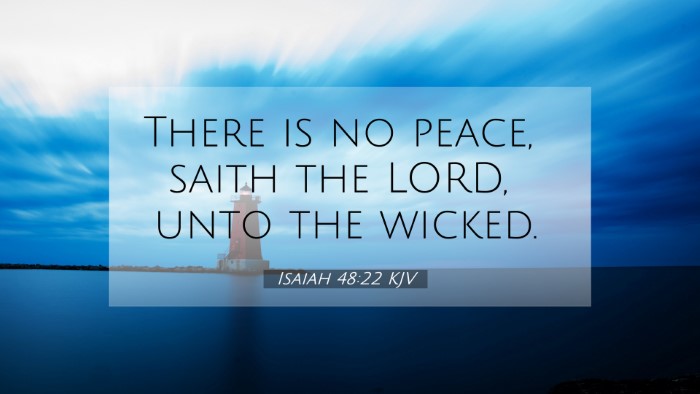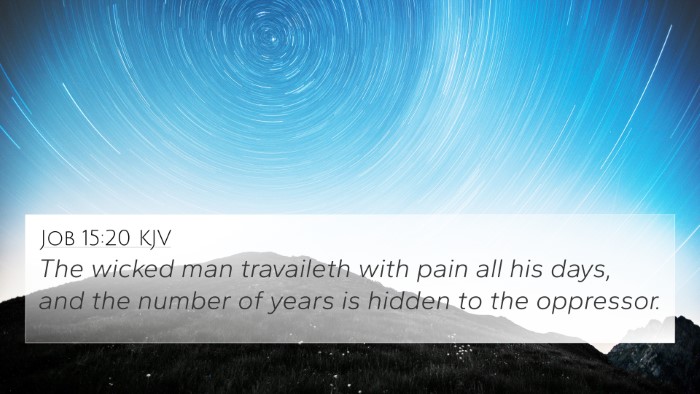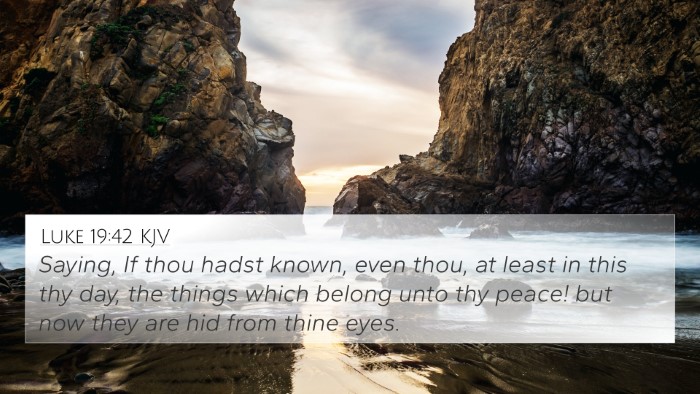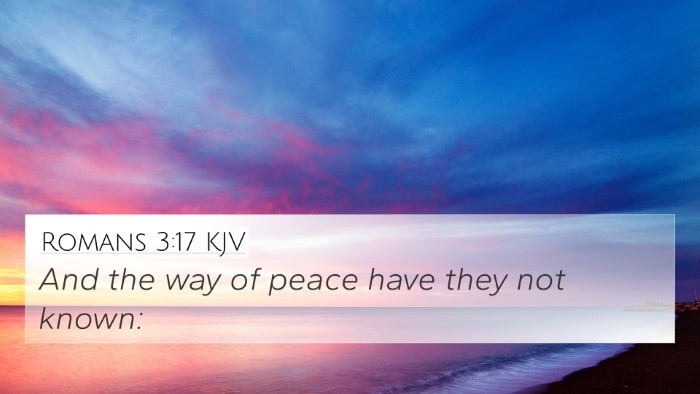Understanding Isaiah 48:22
Bible Verse: Isaiah 48:22 - "There is no peace, saith the Lord, unto the wicked."
This verse presents a stark declaration from God regarding the state of the wicked. In this context, “the wicked” refers to those who have turned away from God and His ways. The lack of peace mentioned here encapsulates spiritual turmoil, separation from God, and the consequences of sin. Through the insights of reputable public domain commentaries, we can gather a deeper understanding of this verse's significance.
Commentary Insights
Matthew Henry
Matthew Henry emphasizes the eternal truth that peace is a gift from God, and without a relationship with Him, true peace cannot exist. He notes the distinction between the believers and the wicked, outlining that while the former may experience trials, they ultimately have peace through faith. He contrasts this with the wicked, who, devoid of God’s grace, live in constant unrest and inner conflict.
Albert Barnes
Albert Barnes points out that this verse serves as a sobering reminder of the consequences of sin. He elaborates that the absence of peace is not merely a state of mind but rather an indication of the spiritual condition of the heart estranged from God. Barnes notes that the peace the wicked seek in worldly endeavors is ultimately unfulfilled, as they are distanced from the true source of peace – God Himself.
Adam Clarke
Adam Clarke provides a thorough analysis, reinforcing the concept that peace is inherent to those who follow God’s commands. Clarke views this verse as an assurance to the faithful that their commitment to God yields peace, contrasting it with the instability faced by the wicked. He also discusses the historical context in which Isaiah delivered this message, where the nation of Israel was reminded of their covenant with God and the dire consequences of turning away from Him.
Key Themes
- Separation from God: The verse illustrates that walking in rebellion against God leads to a lack of peace.
- Spiritual Restlessness: The wicked, by their choices, find themselves in states of turmoil that cannot be remedied by worldly pursuits.
- Peace as Divine Gift: It underscores that true peace is rooted in God and His righteousness.
- Covenant Relationship: Reinforcement of Israel’s need for repentance to restore their relationship with God.
Bible Cross References
This verse can be cross-referenced with several others, illustrating consistent Biblical themes:
- Isaiah 57:21: "There is no peace, saith my God, to the wicked."
- Romans 3:17: "And the way of peace have they not known."
- James 3:18: "And the fruit of righteousness is sown in peace of them that make peace."
- John 14:27: "Peace I leave with you, my peace I give unto you: not as the world giveth, give I unto you."
- Ephesians 2:14: "For he is our peace, who hath made both one, and hath broken down the middle wall of partition between us."
- Colossians 3:15: "And let the peace of God rule in your hearts, to the which also ye are called in one body; and be ye thankful."
- Philippians 4:7: "And the peace of God, which passeth all understanding, shall keep your hearts and minds through Christ Jesus."
Practical Applications
This verse encourages individuals to reflect on their relationship with God. Here are some practical applications based on the insights gained:
- Self-Examination: Consider whether you are pursuing peace in worldly ways or through a relationship with God.
- Prayer and Repentance: Seek God in prayer, acknowledging any areas where distance may have formed due to sinful choices.
- Seek Community: Engage with a faith community that encourages spiritual growth and accountability.
- Study God’s Word: Use the suggested cross-references to deepen your understanding of peace in biblical contexts.
Conclusion
In conclusion, Isaiah 48:22 serves as a powerful reminder of the absence of peace in the lives of those who reject God's guidance. The interpretations from various commentaries provide a comprehensive understanding of the themes of peace, righteousness, and the consequences of sin. This verse beckons believers to acknowledge the peace offered through a relationship with God and encourages a life aligned with His will, ultimately leading to spiritual fulfillment and joy.
Further Study: For those interested in exploring the connections between Bible verses, utilizing tools such as a Bible concordance or a cross-reference Bible study guide can enhance your understanding of thematic Bible verse connections.
Related Themes: Consider studying how Old Testament prophecies and New Testament fulfillment align in their messages about peace and righteousness.
